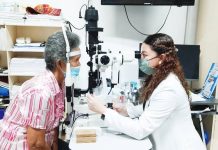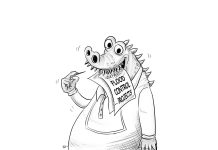
(By Dr. Joseph D. Lim and Dr. Kenneth Lester Lim, BS-MMG, DDM, MSc-OI)
MISSING teeth when replaced with fixed prostheses may protect against cognitive decline.
Maintaining masticatory ability, or the ability to chew well, may play a role in the protective association, according to a study conducted by Elizabeth Kaye of Boston University.
The study, which examined 577 men in the Normative Aging Study of the US Veterans Administration and the Dental Longitudinal Study, was made to determine if the replacement of missing teeth with fixed prostheses may protect against cognitive decline.
Kaye recorded the tooth status and type of replacement, if any, at triennial dental examinations from 1969 to 2001. Masticatory efficiency was assessed with carrot chewing tests. The Spatial Copying Task (SCT) or cognition assessment was administered up to four times between 1995 and 2001.
The study determined poor cognition, adjusted for education, epilepsy medication use, and time-varying values of tooth status (present, absent, fixed bridge/implant, removable replacement), age, cigarette smoking, and coronary heart disease.
The mean age at initial cognitive testing was about 68 years. Twenty-nine percent of study participants lost no teeth; 34 percent lost teeth that were not replaced; 13 percent had missing teeth subsequently replaced with fixed prostheses; and 25 percent had missing teeth replaced with removable prostheses.
New fixed prostheses were associated with a lower hazard of poor cognition. New removable prostheses were associated with a higher hazard.
Loss of a tooth with no replacement was not associated with a significantly higher hazard of poor cognition.
Masticatory ability declined by 6 percent in men with new fixed prostheses compared to men with no tooth loss, new removable prostheses, and tooth loss but no replacement, respectively.
The study was presented during a conference of the American Association for Dental, Oral, and Craniofacial Research (AADOCR), a nonprofit organization with a mission to drive dental, oral, and craniofacial research to advance health and well-being.
AADOCR represents individual scientists, clinician-scientists, dental professionals, and students based in academic, government, non-profit and private institutions who share our mission. It is the largest division of the International Association for Dental Research.
***
Dr. Joseph D. Lim, Ed. D., is the former Associate Dean of the College of Dentistry, University of the East; former Dean, College of Dentistry, National University; Past President and Honorary Fellow of the Asian Oral Implant Academy; Honorary Fellow of the Japan College of Oral Implantologists; Honorary Life Member of the Thai Association of Dental Implantology; and Founding Chairman of the Philippine College of Oral Implantologists. For questions on dental health, e-mail jdlim2008@gmail.com or text 0917-8591515.
***
Dr. Kenneth Lester Lim, BS-MMG, DDM, MSc-OI, graduated Doctor of Dental Medicine, University of the Philippines, College of Dentistry, Manila, 2011; Bachelor of Science in Marketing Management, De la Salle University, Manila, 2002; and Master of Science (MSc.) in Oral Implantology, Goethe University, Frankfurt, Germany, 2019. He is an Associate Professor; Fellow, International Congress of Oral Implantologists; Member, American Academy of Implant Dentistry and Fellow, Philippine College of Oral Implantologists. For questions on dental health, e-mail limdentalcenter@gmail.com./PN







